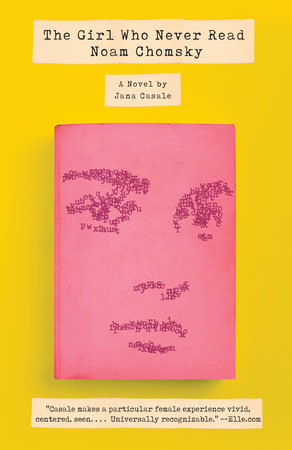READERS GUIDE
QUESTIONS AND ANSWERS…
1. Following Leda from her formative years in college through to her death allows for a macro perspective on her life, and yet we (and she) find the greatest meaning in small moments, “the little pieces of her life that fit together seamlessly and without touching” (239). Which moments in the novel stood out to you as most formative? Consider both those that are traditional life landmarks (marriage, having a baby, etc.) and those that are more unique to her.
2. What role do books and writing serve in Leda’s life, and how do they meet different needs over time? In light of this question, what do you think the title means? Do you think never having read the Noam Chomsky book she buys is a failure of sorts? Or does it say something else about her character?
3. When Leda makes her first forays into romantic life and long-term friendships, the Internet and social media are increasingly prevalent in her peers’ communication and sense of connection. How does she succumb to and resist the pressures of online dating (the “antithesis” to fertility, she says [237]), and other impersonal connections with her girlfriends and boyfriends? Does her experience seem true to life in today’s age? How does it compare to women’s concerns about relationships five, ten, twenty, or fifty years ago?
4. Which of Leda’s female friends provides her with the most support and insight? Consider even her most fleeting and troublesome interactions, such as those with Rochelle and the moms in her neighborhood. What is it about the friendships that endure, and where do some people fall short of being truly supportive?
5. How do the women in the novel stand up to and/or fall prey to the expectations of men when it comes to how they see their bodies, sex, romantic fulfillment, career advancement and independence, parenting, etc.? When does Leda, despite her assured personality, find herself wanting to please men more than herself, and what are the repercussions for her sense of self-worth?
6. Discuss mother-daughter relationships in the book. How do certain themes, especially with regard to how mothers influence their daughters’ visions of themselves, carry over from one generation to the next, and how do the women all adapt to changing times? Compare Leda’s conversation with Annabelle about the Barbie with her memory of her ballet class performance (when she gets the dinosaur puppet that she specifically didn’t want). How do we see mother-daughter dynamics operating in each moment?
7. How does Leda feel about aging at different times in her life? Note the differences, too, in how she and John age, and whether this reveals nuances of their particular characters or characteristics of women and men in general.
8. Leda often says or suggests that she knows what she wants, and even claims when she gets engaged that “it felt like adult life, in the way she had envisioned when she was very young” (176). Does she really know what she wants, in the end, and do you think life turns out as she truly expected it to?
9. How did you feel about Leda’s ability to peruse her writing ambitions? Recall how she tells Annabelle about her passions and what happens in the community writing group, when she resurrects her orca story. Does Leda seem satisfied with her decisions about writing?
10. Describe how the passage of time is rendered in the novel. Do certain periods seem to move more quickly or slowly than others? Why do you think that is? What effect did that have on your engagement with Leda’s major life milestones?
11. Where is Leda most at home, if anywhere? How does her close-knit circle of friends and family fit with your vision of modern life? In this respect, how would the book be different if it were set in another time period?
12. Were there moments in Leda’s life that you related to more or less than others? How can these specific examples of one person’s experiences be extrapolated into bigger truths about our human condition, or, as she puts it, the “innate truth of womanhood” (343)?
13. Do you have a “Noam Chomsky” in your library—a book that you mean to read but never do? What is its significance in your life, and why do you think you haven’t read it yet?
ABOUT THIS GUIDE…The questions, discussion topics, and other material that follow are intended to enhance your group’s conversation of
The Girl Who Never Read Noam Chomsky, a searingly intimate chronicle of a modern woman’s life as she navigates love, work, motherhood, and her creative ambitions, told in a voice that’s imbued with the often hilarious absurdity of life even in the face of heartbreak and loss.

